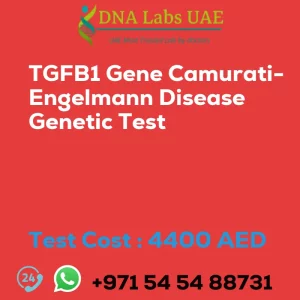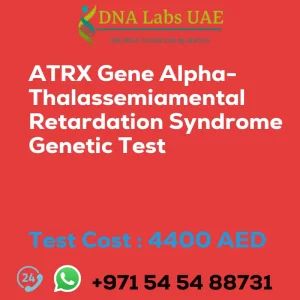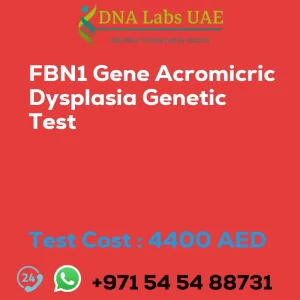PTCH1 Gene Basal Cell Nevus Syndrome Genetic Test
Are you concerned about the possibility of having Basal Cell Nevus Syndrome? DNA Labs UAE offers the PTCH1 Gene Basal Cell Nevus Syndrome Genetic Test to provide you with the answers you need. In this blog post, we will discuss the test components, cost, symptoms, diagnosis process, and more.
Test Name: PTCH1 Gene Basal Cell Nevus Syndrome Genetic Test
Components: Blood or Extracted DNA or One drop Blood on FTA Card
Price: 4400.0 AED
Report Delivery: 3 to 4 Weeks
Method: NGS Technology
Test Type: Dysmorphology
Doctor: Pediatrics
Test Department: Genetics
Pre Test Information
Before undergoing the PTCH1 Gene Basal Cell Nevus Syndrome Genetic Test, it is important to provide the clinical history of the patient. Additionally, a genetic counseling session will be conducted to draw a pedigree chart of family members affected by the syndrome. This will help in the analysis of the PTCH1 gene and ensure accurate results.
Test Details
The PTCH1 gene is responsible for encoding a protein called Patched-1. This protein is involved in the Hedgehog signaling pathway, which plays a crucial role in embryonic development and tissue homeostasis. Basal Cell Nevus Syndrome, also known as Gorlin Syndrome, is a rare genetic disorder characterized by the development of multiple basal cell carcinomas and other tumors.
NGS (Next-Generation Sequencing) is a high-throughput DNA sequencing technology used in this genetic test. It allows for the rapid and efficient sequencing of large amounts of DNA. In the context of the PTCH1 gene, NGS can analyze it for mutations associated with Basal Cell Nevus Syndrome. This aids in diagnosing individuals with the syndrome and providing appropriate medical management and genetic counseling.
To perform the PTCH1 Gene Basal Cell Nevus Syndrome Genetic Test, a DNA sample is obtained from the individual. This is typically done through a blood or saliva sample. The DNA is then sequenced using NGS technology to identify any mutations or variations in the PTCH1 gene. The results of the test can confirm a diagnosis of Basal Cell Nevus Syndrome and guide treatment options and genetic counseling for the individual and their family members.
If you suspect that you or a family member may have Basal Cell Nevus Syndrome, don’t hesitate to reach out to DNA Labs UAE. Our PTCH1 Gene Basal Cell Nevus Syndrome Genetic Test can provide the answers you need for proper diagnosis and management.
| Test Name | PTCH1 Gene Basal cell nevus syndrome Genetic Test |
|---|---|
| Components | |
| Price | 4400.0 AED |
| Sample Condition | Blood or Extracted DNA or One drop Blood on FTA Card |
| Report Delivery | 3 to 4 Weeks |
| Method | NGS Technology |
| Test type | Dysmorphology |
| Doctor | Pediatrics |
| Test Department: | Genetics |
| Pre Test Information | Clinical History of Patient who is going for PTCH1 Gene Basal cell nevus syndrome NGS Genetic DNA Test. A Genetic Counselling session to draw a pedigree chart of family members affected with PTCH1 Gene Basal cell nevus syndrome NGS Genetic DNA Test gene PTCH1 |
| Test Details |
The PTCH1 gene is a gene that encodes for a protein called Patched-1. This protein is involved in the Hedgehog signaling pathway, which plays a crucial role in embryonic development and tissue homeostasis. Basal cell nevus syndrome, also known as Gorlin syndrome, is a rare genetic disorder characterized by the development of multiple basal cell carcinomas (a type of skin cancer) and other tumors. It is caused by mutations in the PTCH1 gene, which disrupt the normal functioning of the Hedgehog signaling pathway. NGS (Next-Generation Sequencing) is a high-throughput DNA sequencing technology that allows for the rapid and efficient sequencing of large amounts of DNA. In the context of genetic testing, NGS can be used to analyze the PTCH1 gene for mutations associated with basal cell nevus syndrome. This can help in diagnosing individuals with the syndrome and providing appropriate medical management and genetic counseling. The PTCH1 gene basal cell nevus syndrome NGS genetic test involves obtaining a DNA sample from the individual, typically through a blood or saliva sample. The DNA is then sequenced using NGS technology to identify any mutations or variations in the PTCH1 gene. The results of the test can help confirm a diagnosis of basal cell nevus syndrome and guide treatment options and genetic counseling for the individual and their family members. |








